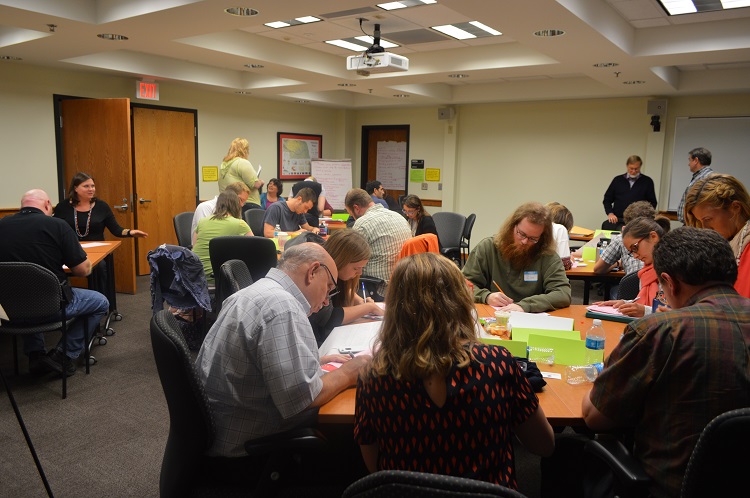
Chris Moore, conflict management expert and mediator, recently led an environmental conflict management short-course at Hardin Hall. Thirty graduate students and two staff members attended. Moore has more than 35 years of experience as a mediator. He has worked in war-torn parts of the world including Myanmar and Sudan to facilitate conflict resolution.
"Dr. Moore was an enthusiastic presenter who clearly loves what he does," said Maggi Sliwinski, applied ecology doctoral student. "He had lots of anecdotes that allowed us to develop a deeper understanding of the methods he was describing or the issues we were discussing."
Richael Young, program associate at the Robert B. Daugherty Water for Food Institute, agreed that Moore's firsthand experiences enhanced the overall caliber of the course.
"Dr. Moore is an engaging and thoughtful instructor," Young said. "His experience in the field impressed us all, and made him an exceptionally good teacher. Every question of ours was answered with an anecdote he had to back it up."
The course involved role playing to give participants real-world scenarios with which to apply their freshly learned knowledge.
Christine Haney, SNR lecturer and program specialist, said the role playing allowed participants to engage on a higher level beyond just discussing "possibilities and potentials."
"Many of us have held various roles in government, education or professional capacities where we have been exposed to situations involving some degree of environmental conflict management," Haney said. "It was easy to see how useful this training will be."
The diversity of disciplines present at the SNR course impressed Moore.
"The interest and level of participation was very high," Moore said. "Lots of people talked and they had questions. I really enjoyed meeting the students."
Although Moore serves as a mediator in a variety of national and international situations – including land disputes in areas ravaged by civil war – he said that natural resources professionals encounter unique challenges.
"People who are involved in natural resources issues face what I would call technical or scientific issues and they also face people issues," Moore said. "Sometimes these interface and one of the things that results is conflict. People may disagree over data, how it’s collected or assessed and they may have different interests and values."
Sliwinski echoed that sentiment.
"A lot of practice is required to be good at facilitating meetings or managing people and tense situations," Sliwinski said. "It can take a lot of time and energy to move participants toward a consensus agreement, which is usually what is desirable in environmental conflicts, but the rewards make it all worthwhile."
Participants gave both the course material and Moore high marks in their evaluations. To learn more about Moore and his experiences, visit http://go.unl.edu/z90n.
"We are so very fortunate, here in SNR, to have forward-thinking faculty and administration who recognize the absolute benefit of providing these types of experiences for their faculty, staff and students," Haney said. "The participants were from fairly diverse backgrounds and there was not a single one of us who won't benefit from this at some point in our academic and professional careers."
— Mekita Rivas, Natural Resources
More details at: http://go.unl.edu/z90n